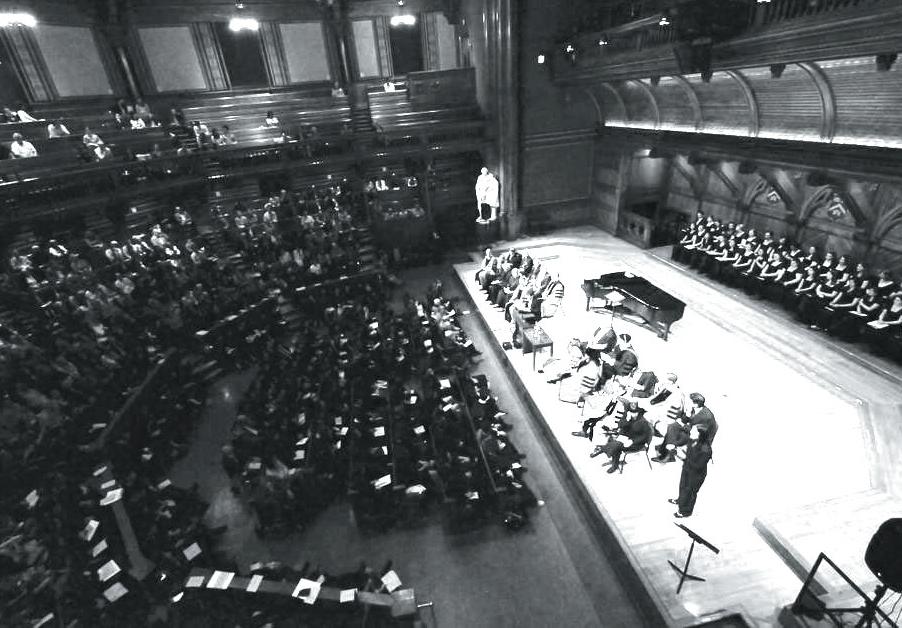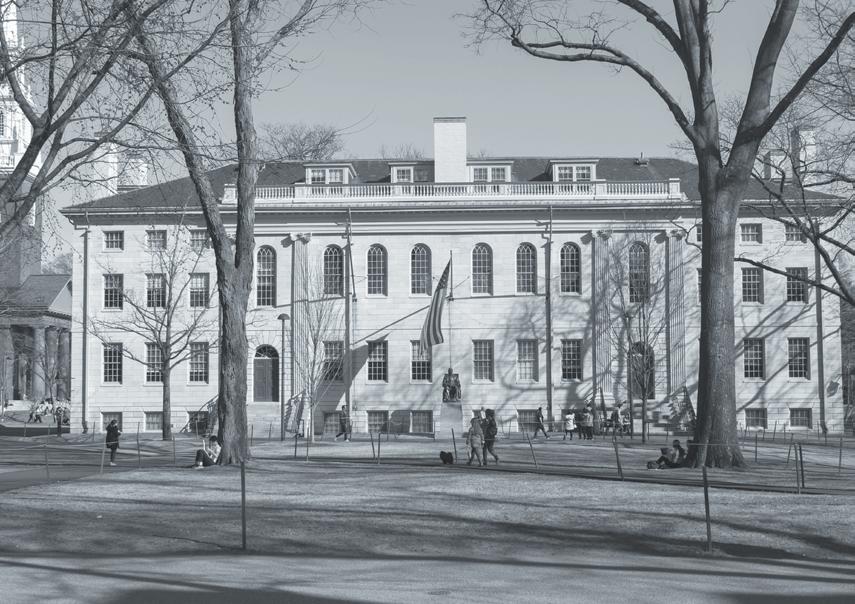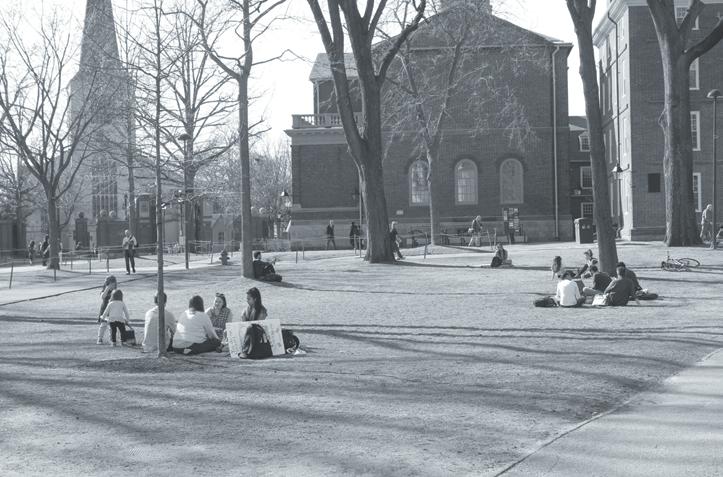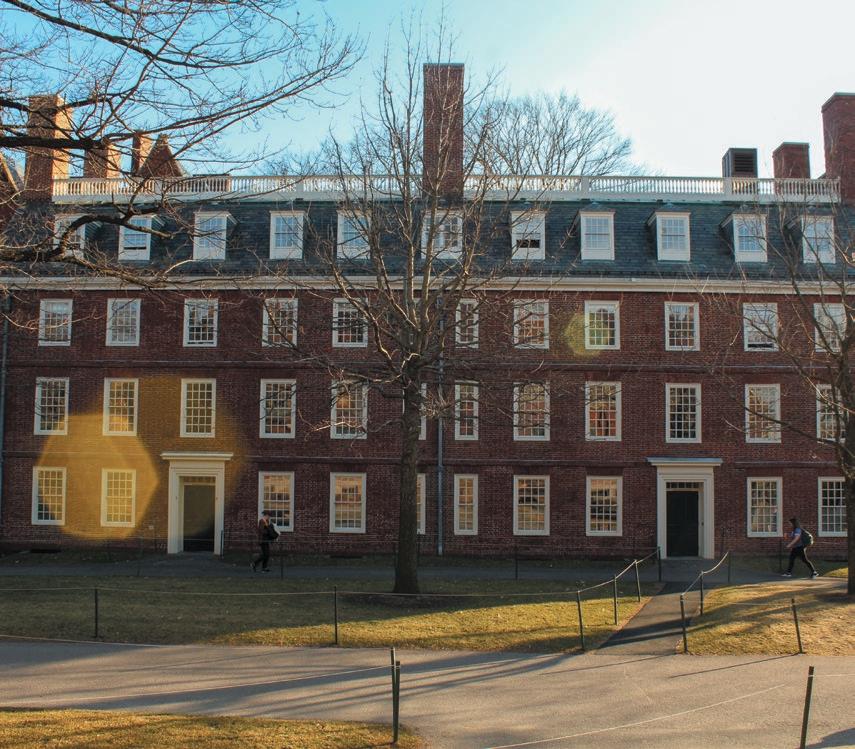Page 5
THE HARVARD CRIMSON | March 10, 2020
Program From Page 1
Thefts From Page 1
College Pilots New Pre-O Program Multiple Thefts in River Houses incorporate leadership skills in their own way, but LIFE will focus on naming those skills,” Colleran wrote. The DSO will administer pre- and post-assessments to evaluate the effectiveness of the pilot program. Beyond the fiveday pilot, Colleran wrote that she hopes LIFE will encourage a new focus on leadership-oriented opportunities for undergraduates at the College. “Long-term, the hope is that this kicks off for first-years a desire to be more reflective on their leadership practices,” Colleran wrote. “It could fit into the larger sphere of leadership programming a student can participate in during their time at Harvard.” Colleran wrote that the College will wait before making the program permanent. “For now, we’re going to see how the first year goes,” Colleran added.
The Dean of Students Office is piloting a new pre-orientation program in Fall 2020 to teach incoming freshmen about leadership on Harvard’s campus. aiyana g. white—Crimson photographer
juliet.isselbacher@thecrimson.com simon.levien@thecrimson.com
Up the street in Adams House’s Hampden building, HUPD officers responded to a report of unlawful entry and theft. The stolen items include two Macbooks valued at $1,500 and $1,200, Airpods, a backpack and a wallet, according to the police log. An incident was also reported in Mather House, where $60 in unattended cash went missing. According to HUPD police logs, all four thefts are still under investigation. In an email to University affiliates last Wednesday, HUPD spokesperson Steven G. Catalano and HUPD reminded residents that burglaries into occupied rooms are “rare,” but students should still take proper precautions to prevent theft. Catalano and HUPD advised students to lock their doors at all times and be aware of other building entrants. “Residents should not prop interior or exterior doors at any
time, hold an outside door open for strangers, or allow strangers to ‘piggyback’ on their access card,” Catalano wrote. Catalano also encouraged students to call the department immediately if they observe someone acting suspiciously or attempting to enter a dorm. “Suspicious behavior may include a stranger knocking on your door and asking an out-ofplace question, such as ‘did you lose these keys,’ or making an excuse for being found in your room,” he wrote. Catalano did not respond to a request for comment. In a bid to reduce thefts, the Undergraduate Council’s Student Life Committee expressed support for external security cameras outside dorms in 2016. Roughly 90 laptops are stolen annually at the University, according to the HUPD website. charles.xu@thecrimson.com
Kirkland Finalizes Second New Shield Faculty Survey Indicates Gender Inequality faculty From Page 1
By Sydnie m. cobb and declan j. knieriem Crimson Staff Writers
H arvard University officials have approved a new shield for Kirkland House after a redesign process ran into trademark concerns. House Administrator Katherine J. Drizos Cavell presented the new shield in an Friday email to House affiliates on behalf of Kirkland Faculty Deans Verena A. Conley and Tom C. Conley. “Verena and Tom Conley are happy to announce that Kirkland has a new shield!” she wrote. “Verena and Tom thank those who shared their thoughts, stories, time, experiences, and preferences in this process.” The announcement caps a redesign process that came in response to student concerns that the house’s former emblem bore a resemblance to the Confederate flag. Cavell also noted that students can “immediately” begin using the new shield — which bears a design featuring three white stars arranged horizontally on a black strip with a crimson background — and that Kirkland’s Housing Day festivities would incorporate the new design. However, University news has put a wrinkle in that plan. Faculty of Arts and Sciences Registrar Michael P. Burke announced in an email Monday that Housing Day — an annual tradition in which the College assigns each freshman to one of the 12 houses for upperclassmen — will be postponed indefinitely due to concerns over the ongoing spread of coronavirus. Verena Conley said in a Monday interview that the University approved the second design faster than she anticipated. She also said she thinks the change is a “great” moment for the students who worked on the redesign. “I think it’s wonderful because the students have been waiting for a long time,” she said. The official approval for the new design comes several days after the Harvard Trademark Program rejected the initial redesign proposal for the shield over concerns that that design
would infringe on an existing trademark. Dean of the College Rakesh Khurana previously gave preliminary approval for its initial redesign. The Trademark Program identified an existing trade-
national politics and the University administration, respectively. This third installment examines the views of the faculty on Harvard’s climate and culture, and on Title IX issues within the FAS.
There really is some sense of relief since it’s really going through and really working this time around. It’s been a really long journey, and we’re thankful to everyone at the House who contributed to this amazing process.
The majority of faculty who responded to the survey — 58 percent — felt their department creates an environment where students, faculty, and staff feel “comfortable coming forward” about sexual harassment. Fifty-four percent of women and 61 percent of men agreed with the statement. Still, 43 percent of respondents indicated that they believed their department needs to conduct a survey of departmental climate. In the wake of nearly 20 women accusing former Government professor Jorge I. Dominguez of sexual harassment in 2018, the Government department launched a departmental climate review. That committee ultimately concluded that “prolonged institutional failure” facilitated Dominguez’s abuse. Twenty-four percent of respondents indicated that their work has been limited by gender. Only 11 percent said that they faced barriers at Harvard because of their “racial or ethnic background.” Fifty-eight percent of respondents reported that they felt their department was “doing enough to promote faculty diversity.” Only 42 percent of respondents, however, said the same about the FAS administration. While 55 percent of men felt that the FAS administration appropriately promoted diversity, only 21 percent of women felt the same. Answers to the question on departmental diversity also diverged on gender lines, with 67 percent of men in agreement, but 44 percent of women responded affirmatively. Answers to the questions on diversity also varied between FAS members of different ranks. A slight majority of tenured faculty — 52 percent — felt the FAS administration’s efforts to support diversity were sufficient — but less than 26 percent of lecturers, associate professors and preceptors agreed.
Andrea J. Zhang ‘22 Kirkland House Committee
mark for the first redesign, which featured three stars in an inverted triangle on a black shield with a crimson border, according to the Conleys. Kirkland House Committee Co-Chair Andrea J. Zhang ’22 said she believes Kirkland residents felt relieved after the University approved the new design. “There is a sense of relief since it’s really going through and really working this time around,” Zhang said. “It’s been a really long journey, and we’re thankful to everyone at the House who contributed to this amazing process.” Maranda Ngue ’22, co-chair with Zhang, said that, despite seeing the initial rejection as a “bump in the road,” she found Kirkland residents’ support made the second attempt easier. “Even when we hit the bump, I already knew that Kirkland was going to fight until we got our shield, and it’s been a very supportive process from everyone in Kirkland,” she said. “Whatever the outcome was, we knew Kirkland would be very proud of it,” she added. sydnie.cobb@thecrimson.com declan.knieriem@thecrimson.com
Departmental and FAS-Wide Climate
Sixty-nine percent of tenured respondents felt that their department was doing enough, but only 32 percent of preceptors agreed. In response to The Crimson’s survey results, University spokesperson Jonathan L. Swain pointed to a question Harvard’s 2019 Pulse Survey, in which 65 percent of academics and faculty members “somewhat agreed, agreed or strongly agreed” that Harvard’s leaders would take “appropriate action in response to incidents of harassment and discrimination.” Additionally, a write-in question on The Crimson’s survey asked respondents to identify “specific aspects” of their department or division’s culture that they believed needed to change. The most common answer was improving working conditions for non-tenure-track faculty — in particular, reconsidering placing time caps on their employment contracts. In addition, several respondents called for increased faculty diversity and a wider variety of pedagogical perspectives. FAS spokesperson Anna G. Cowenhoven declined to comment on the survey results.
Sanctions for Sexual Harassment The survey also inquired about faculty’s opinions on punishments levied against two prominent FAS faculty last year over allegations of seuxal harassment. In May 2019, after a year-long investigation into Title IX complaints against Dominguez, Faculty of Arts and Sciences Dean Claudine Gay stripped him of his emeritus status and barred him from campus. Eighty-five percent of respondents agreed with the sanctions against Dominguez, including 59 percent who “strongly agreed.” Ninety-four percent of survey-takers from the Social Sciences, Dominguez’s division, supported the sanctions. Just one percent of all respondents disagreed, and 14 percent neither agreed nor disagreed. Dominguez did not respond to requests for comment. After the allegations became public, graduate students, faculty and some of the women who accused Dominguez repeatedly called on Harvard to initiate an
independent, external review of the circumstances that allowed Dominguez to perpetrate misconduct. University President Lawrence S. Bacow ultimately agreed to the demand in May, and the review began in September 2019. Three percent of respondents indicated that they had been contacted by the external review committee. A slightly smaller majority of survey-takers, meanwhile, supported the sanctions against star Economics professor Roland G. Fryer, Jr., who Harvard and the Commonwealth of Massachusetts began investigating in 2018 for verbal sexual harassment towards employees at his lab. FAS Dean Claudine Gay placed Fryer on a two-year administrative leave in July 2019 for violating University sexual harassment policies, and also permanently closed his lab. Sixty-six percent of respondents agreed with Gay’s sanctions against Fryer, including 33 percent who “strongly agreed.” Five percent disagreed, and 29 percent neither agreed nor disagreed. Fryer did not respond to requests for comment. The majority of survey respondents — 62 percent — agreed that the Harvard Corporation should revoke tenure if a faculty member is found guilty of sexual misconduct by the Office for Dispute Resolution. Opinions diverged, however, along lines of gender and position. While 80 percent of women believed a guilty faculty member should receive the severe punishment, just 49 percent of men agreed. Likewise, more than 90 percent of assistant professors and preceptors, and more than 70 percent of associate professors and lectures, supported the sanctions, but only 42 percent of tenured faculty agreed. Responses between the youngest and oldest age groups surveyed starkly differed. Among respondents who were 25 to 35 years old, 81 percent agreed with the sanctions. Among faculty 65 and older, meanwhile, only 36 percent agreed.
Methodology For its 2020 Faculty Survey, The Crimson collected electronic responses through Qualtrics, an online survey platform,
The sights and sounds of Harvard.
The Crimson
@crimson_photo
from Feb. 20 to 27, 2020. A link to the anonymous survey was sent to 1,341 FAS and SEAS faculty members through emails sourced in October 2019 from Harvard directory information. The pool included individuals on Harvard’s Connections database with FAS titles, including emeritus, tenured, tenure-track, and non-tenuretrack faculty. Of those faculty, 476 accessed the link to the survey. A total of 416 participants answered at least one question, while 263 participants completed every question in the survey. To prevent participants from accidentally taking the survey more than once, The Crimson enabled Qualtrics’ browser cookie functionality to register unique survey sessions on each device. This device data is controlled by Qualtrics, and The Crimson does not retain information that could identify devices accessing the survey with anonymous responses. In an effort to check for response bias, The Crimson compared respondent demographics with publicly available information on faculty demographics provided by the University — information regarding gender, minority background, SEAS affiliation, and ladder versus non-ladder status. Overall, respondent demographics tracked with faculty demographics. Of survey respondents, 41 percent identified themselves as women and 20 percent identified themselves as minorities. Based on data in the 2019 FAS Dean’s Annual report, women and minorities make up 39 percent and 24 percent of FAS ladder faculty, respectively. According to the Dean’s report, 41 percent of the FAS were non-ladder faculty — a term synonymous with non-tenuretrack faculty. By contrast, 39 percent of respondents to The Crimson’s survey identified themselves as non-ladder faculty. Of faculty who were sent the link to the survey, 127 — or 9 percent — are affiliated with SEAS. In comparison, of respondents who indicated their divisional affiliation on the survey, 7 percent reported an affiliation with SEAS. james.bikales@thecrimson.com




